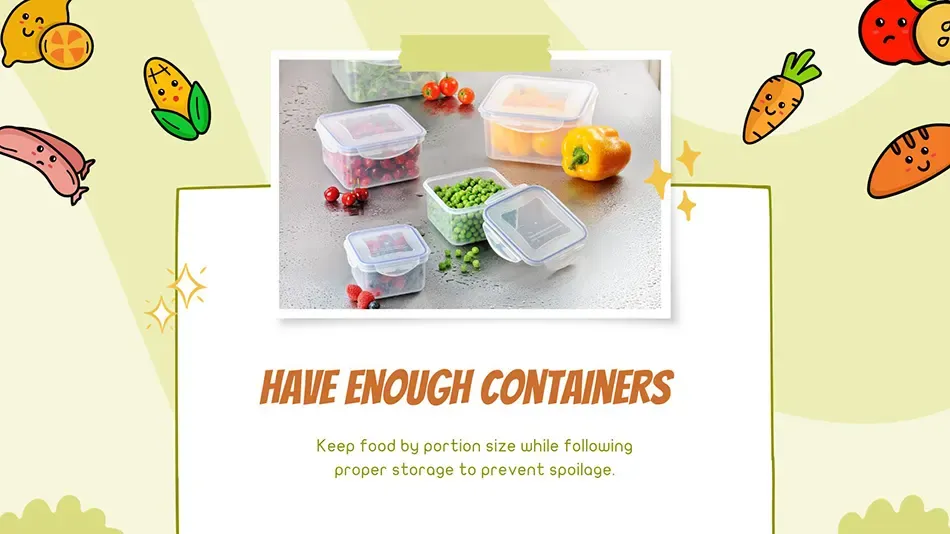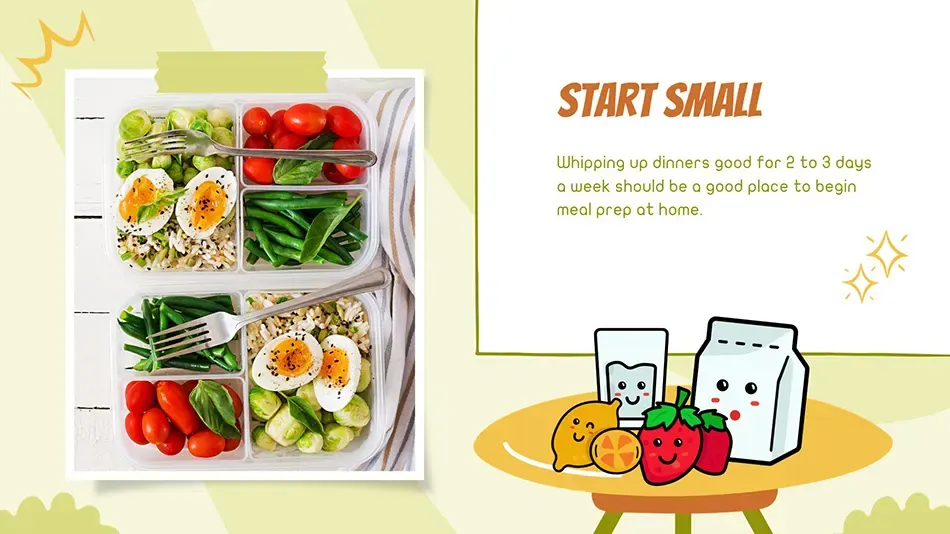Mastering Meal Prep: Save Time and Eat Well

In today's fast-paced world, finding the time to prepare healthy meals can be a challenge. Between work, training, and various commitments, it's all too easy to resort to fast food or takeout for convenience. However, with a little planning and preparation, you can make healthy eating a seamless part of your daily routine. Meal prep is the answer to saving time, money, and calories while ensuring that you're giving your body the nutrients it needs. In this article, we'll explore seven quick and practical tips for mastering meal prep and achieving your health and fitness goals.
Mastering Meal Prep: Saving time and money

- Plan Ahead: Before you embark on your meal prep journey, take a moment to plan your meals for the week. The key to successful meal prep is meticulous planning. Start by selecting a variety of healthy, nutrient-dense foods that you enjoy. Creating a meal plan not only saves you time but also helps you make healthier choices. Once you've decided on your meals, create a detailed grocery list to ensure you have all the necessary ingredients. Planning ahead can prevent impulsive purchases and make healthy eating a breeze.
- Batch Cook: Batch cooking is a game-changer when it comes to meal prep. It allows you to save both time and money while ensuring you have nutritious meals ready throughout the week. Choose a few of your favorite recipes and prepare them in large batches. This approach works well for soups, stews, casseroles, and many other dishes. You can freeze the leftovers for later use or store them in the refrigerator for quick and convenient meals on busy days. Batch cooking not only simplifies your meal prep routine but also reduces the temptation to opt for less healthy options when you're short on time.
- Use Portion Control: Portion control is a crucial aspect of maintaining a healthy weight and achieving the right balance of nutrients. To ensure you're consuming appropriate portion sizes, invest in measuring cups or a food scale. These tools make it easy to portion out your meals accurately. Not only does portion control support your health goals, but it can also save you money by reducing food waste. By knowing exactly how much you need, you can avoid overbuying and throwing away excess food.
- Choose Healthy Fats:Not all fats are created equal. When meal prepping, make a conscious effort to select healthy fats such as olive oil, avocado, nuts, and seeds. These fats provide your body with essential fatty acids and help promote satiety. In contrast, trans fats and saturated fats should be avoided, as they can increase the risk of heart disease and other health issues. Opting for healthier fats not only benefits your well-being but also enhances the flavor of your meals.
- Incorporate Protein: Protein is an essential nutrient for your body. It aids in building and repairing muscle tissue, boosts metabolism, and promotes a feeling of fullness. When meal prepping, ensure that you include lean sources of protein such as chicken, fish, beans, and lentils. These protein sources will help you meet your daily protein requirements and keep you feeling satisfied between meals. By incorporating protein into your meal prep, you'll be better equipped to reach your health and fitness goals.
- Prep Snacks: Healthy snacks play a significant role in maintaining energy levels and preventing unhealthy munching. Prepping snacks like sliced vegetables with hummus, fresh fruit, and a variety of nuts can be a lifesaver when hunger strikes. These prepped snacks are not only convenient but also help you avoid the temptation of reaching for less nutritious options when you're in a hurry. By keeping healthy snacks on hand, you'll stay on track with your health goals while satisfying your cravings.
- Don't Forget Hydration: Staying adequately hydrated is essential for overall health and wellness. Carry a reusable water bottle with you throughout the day and aim to drink at least eight glasses of water daily. You can also infuse your water with herbal tea, coconut water, or slices of fruit for added flavor and hydration. Proper hydration supports digestion, energy levels, and overall well-being, making it a vital component of your meal prep routine.
Additional Meal Prep Strategies
- Variety and Balance: While planning your meals, strive for diversity and balance. Incorporate a wide range of food groups, including vegetables, fruits, whole grains, lean proteins, and healthy fats. This not only enhances the nutritional quality of your meals but also keeps your palate excited.
- 2. Prep in Batches: Rather than cooking every meal from scratch, prepare basic ingredients in larger quantities. Cook a batch of brown rice, quinoa, or roasted vegetables at the beginning of the week. These can serve as building blocks for various meals, saving you time and effort.
- 3. Storage Containers: Invest in high-quality, reusable storage containers that are microwave and dishwasher-friendly. These containers are essential for keeping your prepped meals fresh and organized. Look for stackable options to maximize your refrigerator and freezer space.
- 4. Label and Date: When storing your meals, label them with the date of preparation. This helps you keep track of freshness and ensures you consume your meals before they spoil. Proper labeling can also help you maintain a rotation system to avoid food waste.
- 5. Rotate Your Ingredients: To keep your meals exciting and cost-effective, use seasonal produce. Seasonal fruits and vegetables are often more affordable and taste better. Check a seasonal produce guide to discover what's in season and incorporate these items into your meal plan.
- 6. Batch Cooking Methods: Utilize different cooking methods to add variety to your meals. Besides baking and sautéing, consider using small kitchen appliances like slow cookers and air fryers. These tools can simplify the cooking process and result in flavorful, healthy dishes.
- 7. Track Your Savings: Keeping a record of how much money you save through meal prep can be a motivating factor in sticking to your routine. Knowing that you're not only eating healthier but also spending less can encourage you to stay committed to your meal prep goals.
The Benefits Of Meal Prep

- Saves Time: One of the most significant advantages of meal prep is time savings. By preparing meals in advance, you can significantly reduce the time spent on daily cooking and meal planning. This is especially helpful for busy individuals with hectic schedules.
- Promotes Healthy Eating: Meal prep allows you to have control over the ingredients and portions in your meals. This means you can choose healthier options, control portion sizes, and avoid the temptation of unhealthy fast food or takeout.
- Saves Money: Preparing meals at home is typically more cost-effective than dining out or ordering takeout regularly. Meal prep helps you budget your food expenses more efficiently, as you can buy ingredients in bulk and reduce food waste.
- Reduces Food Waste: When you plan your meals and portion them out in advance, you're less likely to waste food. Leftovers can be repurposed into new meals or frozen for future consumption, minimizing food waste and saving money.
- Portion Control: Meal prep allows you to control portion sizes, which can be beneficial for weight management and achieving nutritional goals. You can measure and customize servings to meet your specific dietary needs.
- Consistency: With meal prep, you can maintain dietary consistency. You know exactly what you're consuming and can ensure that your meals align with your nutritional goals, whether you're aiming for weight loss, muscle gain, or overall health.
- Convenience: Having pre-prepared meals ready to go makes it convenient to eat healthily, especially on busy days when you might otherwise opt for fast food or unhealthy snacks. This convenience can help you stay on track with your dietary choices.
- Improved Food Quality: When you prepare meals at home, you have control over the quality of ingredients you use. You can choose fresh, high-quality ingredients, which can enhance the taste and nutritional value of your meals.
- Variety and Creativity: Meal prep allows you to experiment with different recipes, cuisines, and flavors. You can incorporate a wide range of ingredients and dishes into your meal plan, preventing culinary monotony.
- Healthier Snacking: Preparing healthy snacks as part of your meal prep ensures that you have nutritious options readily available. This can help curb unhealthy snacking and maintain steady energy levels throughout the day.
- Less Stress: Knowing that you have meals prepared in advance can reduce the stress associated with last-minute meal decisions or kitchen chaos. Meal prep brings a sense of organization and calm to your daily routine.
- Supports Dietary Goals: Whether you have specific dietary goals like tracking macros, following a specific diet plan, or managing food allergies, meal prep allows you to align your meals with these objectives effectively.
- Encourages Mindful Eating: By planning and preparing your meals, you become more mindful of your food choices. You can focus on eating mindfully, savoring the flavors, and appreciating the nutritional value of your meals.
- Enhances Time Management: Meal prep fosters better time management skills. It encourages you to allocate time for meal planning and cooking, helping you make the most of your daily schedule.
Post a Comment